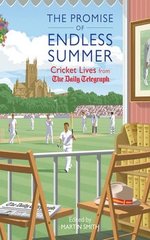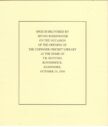The Promise of Endless Summer
Martin Chandler |Published: 2013
Pages: 256
Author: Smith, Martin (Editor)
Publisher: Aurum
Rating: 4 stars

I can see why an editor would want to give a collection of cricketing obituaries the title The Promise of Endless Summer, and in many ways it works quite well here, as much of the contents of this collection are the sort of winsome eulogies that are usually produced on the death of well known figures who, by and large, have spent their summers giving pleasure to others.
WG Grace was but a slip of a lad in short trousers when The Daily Telegraph first appeared but, perhaps oddly, it was the 1980s before it started to print “proper” obituaries for cricketers, as opposed to straightforward and sombre news items or death notices, so Martin Smith did not have to go back too far to put this collection together.
Most of the obituaries featured are workmanlike rather than compelling, a number from the pen of EW “Jim” Swanton, and others from such well known names as Tony Lewis, Scyld Berry and Derek Pringle. What I find particularly strange is that half of the 80 odd entries are uncredited. I struggle to believe that the authors’ names do not exist somewhere in the paper’s archive, but the implication in Smith’s introduction is that they do not. In respect of arguably the two greatest ever West Indian fast bowlers the bar is raised a little by Simon Hughes (on Sylvester Clarke), and Mark Nicholas (on Malcolm Marshall), but in reality there are just five pieces of writing in The Promise of Endless Summer that easily raise it from 3 stars to 4.
Now all of these five pieces come from the same pen, a man who has, in a varied career, already published a selection of his writings on the game, although he is much better known in other fields. I have never read his eponymous cricket book, do not own it, and have studiously left it on the shelves of every one of the various charity shops I have seen it in, but I’ll be remedying that oversight in the very near future – the man is right up there with the very best. His name? Believe it or not I am talking about Michael Parkinson – film critic, chat show host, journalist and the veteran of a famous, in England at least, confrontation with Rod Hull and that “****ing Emu”
The first and, not that that is of any significance, longest in the book is of Harold Larwood. There have always been plenty of hard-nosed Englishmen whose eyes glaze over at the mere mention of the name, and this reviewer is foremost amongst them. The Telegraph’s obituary does not take its content from the pages of Wisden, nor indeed any written source. Parkinson’s source is the conversation that flowed, between the Notts Express and other guests, on the handful of occasions on which he enjoyed Larwood’s company.
Personal touches are an important tool in making any obituary memorable and Telegraph readers were fortunate to have Parkinson, a personal friend of Keith Miller’s, to write his. Again it captures the man to perfection, one particularly appealing tale being; ….hearing a friend was seriously ill in hospital Keith paid him a visit, smuggling in a bottle of booze. They had such a good time that Miller decided to stay the night and was discovered by nurses fast asleep in the patient’s bed.Surely apocryphal? But then perhaps not – after all the story is about Keith Miller.
The Telegraph’s main obituarist for Denis Compton was former Prime Minister John Major, and a sound if unspectacular job he made of it. Uniquely for this book there is however a second piece about Compo, not even 400 words, but another personal memory from Parky captures the spirit of the man more accurately than one or two have done in full biographies.
As with the Compton cameo there is another short piece about David Bairstow, and a wonderful memory of an exchange between the tragic “Bluey”, who would then have been 19, and the Old Bald Blighter, Brian Close, immediately after the latter had returned to the pavilion and was treating his teammates to a rant about an lbw decision he had clearly not approved of – it is priceless.
Last of the five, and bringing up the rear of the book, is George Pope, a Derbyshire all-rounder who played once for England in 1947, and who was a consistent performer in the county game for several years before and after the Second World War. After leaving the First Class game Pope became a league professional and one of the wiliest of all, and that is where, from the perspective of an opposing player, most of the material in his hugely entertaining obituary comes from.
The Promise of Endless Summer is not an essential purchase, and whilst like all books in the nature of an anthology it can be a little uneven, it is still a worthwhile acquisition and, for me anyway, a belated introduction to the work of a man I had never previously considered a “cricket writer”, but certainly do now.






Leave a comment